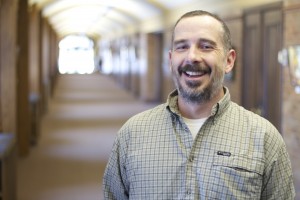 Kenton Lobe, Instructor in International Development Studies, has taught at CMU since 2005.
Kenton Lobe, Instructor in International Development Studies, has taught at CMU since 2005.
What do you love about your work here?
I love working with students, but in addition to that, I love my colleagues. I have a little neighbourhood at the end of the hall where my office is with two English professors and a colleague in International Development Studies. Paul Dyck is one of the colleagues, and he says he likes to think of this gathering of faculty as a fellowship. That always makes me smile, and that’s borne out of really rich conversations that we have across disciplines here. The size and scale of faculty makes that possible.
What are you teaching right now that you’re most excited about?
Participatory Local Development is a second year IDS class. For their major project, students are instructed to create something that roots itself in, and engages the participation of, the CMU community. In the past, that’s resulted in Wittenberg Radio as well as the CMU farm and community garden.
What are you reading for enjoyment?
I just finished reading Silence by Shūsaku Endō, which was recently adapted into a movie by Martin Scorsese. It’s a story of 17th century Jesuit missionaries to Japan and martyrdom. That one had an effect on me. I just started Children of Earth and Sky by Guy Gavriel Kay, a Canadian writer. He writes historical fiction that borders on fantasy.
Where or how do students give you hope?
The most significant hope I get from students is watching the work of the CMU Farm. Two students came to me seven years ago and asked why we don’t have agriculture on our 44 acres here. They put together a proposal, and we worked collaboratively to move that into the CMU context. Ever since then, it’s been the labour of students that has made this farm flourish.
What do you most long for in your work?
I long for the academy to step outside of the classroom walls. We do some of that here at CMU with Outtatown and through our practicum program, but I long for a richer engagement with land-based learning. The CMU Farm is one example, but I’ve had students write papers about the Assiniboine Forest and memory, bridging philosophy and ecology that kind of builds on something right in their own backyard. I often wonder what would happen if we oriented our curriculum and our pedagogy around a 5 km. radius of the university. We could talk about Kapyong and urban reserves, we could talk about rail and transportation of oil, we could talk about wetland restoration on our campus—we could talk about all kinds of things and actually locate these things that otherwise become abstracted.
What saying or motto inspires you?
Whenever I left the house on a Friday night when I was growing up, my dad would always say, “Remember who you are.” Then, when I came to CMBC as a student, Harry Huebner—who was teaching theology at the time—had the same kind of saying. “Remember who you are” is a significant saying that sticks in my mind.
